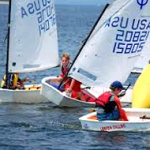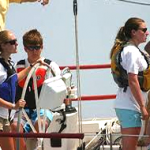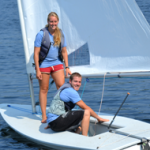Sportsmanship in Sailing
Junior sailing rarely must confront the dreaded Rule 69 at a regatta. From a young age programs stress that sailing is a Corinthian sport. While there are rules and regulations in the sailing, it is also one of the only self-governing sports. To see a sailor withdraw from a race on his or her own accord is one of the greatest acts of sportsmanship one will ever see. A sailor is able to respect rules greater than ones self and maintain composure even when the stakes are at their highest. As Paul Elvstrom said, “You haven’t won the race if in winning the race you have lost the respect of your competitors”
Of course, there are bumps along the way. At a junior regatta it’s all too common to hear a curse word, or to see cliques form on and off the water. While examples such as these are not a rule 69 infraction, they go against the principals that sailing as a sport relies upon. The rules of sailing actually are very separate from Corinthian sailing, rules are technical, sailors such as Dave Perry enjoy diving into situations at the white board and discussing hypotheticals. Sailors who rely on the rules enjoy the mystery, always looking for the next situation that needs to be solved, never using the rules to get anyone else in trouble. And so, in my experience there is a separation of the racing rules of sailing and the Corinthian spirit that sailing relies on. The two are very different because Corinthian spirit stretches far wider than the racing rules of sailing. It’s not against the rules for a white fleeter to allow someone in red fleet to start with space simply because they’re older. But Corinthian spirit would see that as an infraction, you should sail your own race and not let the bigger or better sailor dictate how you start or finish. And it’s up to the red fleeter not to be intimidating or yell at that white fleeter not to head up. Rules are very different from courtesy.
At junior regattas, instructors must also set a good example of sportsmanship and seamanship. While it’s technically not against the rules to motor close to the course, it’s a disrespectful gesture to the sailors, even if you’re just trying to get a closer look. The best coaches are ones that lead by example, helping a sailor in need even if they are not your own. Wearing a CG approved lifejacket when you leave the dock even if you’re in a powerboat. The teacher should also follow these values that are preached to their students. As I said before, Corinthian spirit is not a governing set of rules, it’s a reminder that we must self-govern. Sailing is based on community, rule 69 is designed to exclude those who do not value that community. The rule is used so infrequently because sailing has held such a high standard throughout the years. So when you’re involved in the sport in any capacity, remember the standard you are being held to, hold yourself accountable so that others won’t be forced to.




